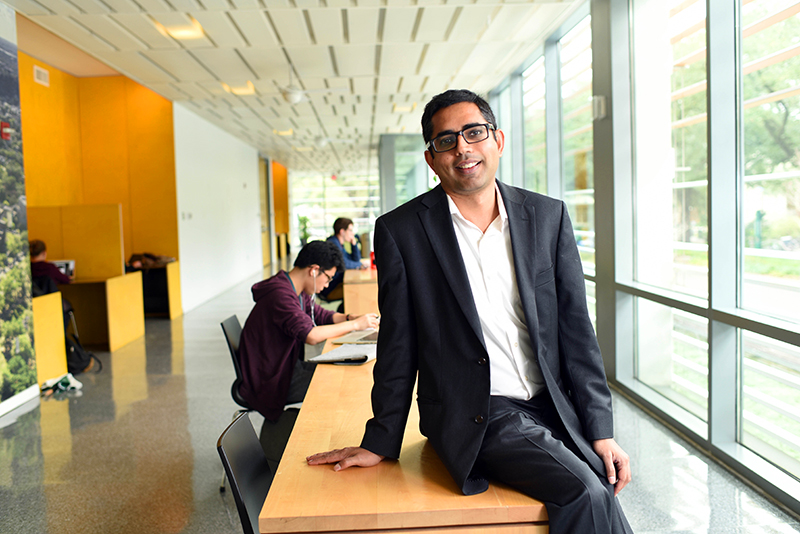New course highlights emerging field of climate finance

From the rise in sea levels to the explosion of extreme weather events, climate change has become one of the most critical issues facing business leaders today, with implications for strategy, risk management, capital investments, supply chain management, shareholder relations and other areas. Now, thanks to an innovative new course developed by Nishad Kapadia, Freeman students are learning how to manage this difficult challenge.
Climate Change, ESG and Financial Markets examines the impact of climate change risk on the economy and explores methods of quantifying and measuring climate exposures.
“Climate change is one of the most important issues impacting financial markets today,” says Kapadia, the John M. Trapani III Professor of Business Administration and associate professor of finance.
Environmental, Social and Governance (ESG) investing has recently been a subject of intense debate, but its influence is growing. Firms want to know how climate change will affect their bottom line. Shareholders seek to invest in businesses that reflect their values. Regulators need to understand the risks different firms face from climate. And investors are focused on risk and return – two factors that are becoming more and more dependent on environmental threats.
Kapadia’s class aims to help students predict what will happen to markets faced with slow-moving risk factors like climate change. Students develop trading strategies, examine shareholder preferences, screen bad investments and investigate how climate change will impact equities, bonds, loans and real estate.
They also study whether an investor’s ESG preferences impact a firm’s capital costs and build a portfolio to find new products, sectors and industries that will mitigate climate risks.
“That really helps students take something abstract and make it very particular,” Kapadia says. “That’s what the class is about.”
Kapadia’s course is one of a growing number of Freeman classes that explore ESG issues. The new full-time MBA curriculum integrates ESG content throughout knowledge courses to help students understand the central role that climate change, social inequities, and energy sustainability transitions will play in the future of business. The curriculum also features a new concentration in Sustainability that focuses on preparing students for a business world impacted by climate change and the transition to renewable energy sources. In addition to Kapadia’s course, other classes offered include ESG in a Dynamic Global World, Energy for Sustainable Development, ESG Reports, and Energy and Environmental Economics.
Kapadia says Climate Change, ESG and Financial Markets offers a good introduction to ESG issues in finance and should appeal to students interested in finance, consulting, accounting and energy markets or renewables. It helps prepare students for careers in fast-growing industries like carbon trading and mutual fund management, he adds, as well as for jobs as investors or consultants helping firms to transition to ESG business models.
Ashley Carollo (BSM/MACCT ’23), who took the course in spring 2023, says she thinks the course will help her in her new job as an auditor with Ernst & Young.
“ESG-related disclosures are becoming a more common practice in the business world, so it’s important that auditors are able to evaluate the disclosures for accuracy and consistency in relation to the financial statements,” Carollo says. “I’m confident I’ll be able to use and apply what I learned in this class, especially the need to have a questioning mindset given that the ESG landscape is rapidly changing.”
--Martha Sanchez (SLA ’24)
Interested in advancing your education and/or career? Learn more about Freeman’s wide range of graduate and undergraduate programs. Find the right program for you.
Recommended Reading
- Finance Curriculum vs. Accounting Curriculum: How Are They Different?
- Business Analytics vs. Finance: Which Master’s Degree Is Right for You?
- Alum leverages MFIN degree to launch investment banking career
- Peter Ricchiuti: The Art of Making Things Make Sense
- What Can You Do With a Business Analytics Degree?
- Meet the MBA Class of ’26: Austin Smith
- Fintech entrepreneur Todd Schwartz to serve as 2024 Freeman Distinguished Lecturer
- Master of Finance degree leads to career in health care and analytics
Other Related Articles
- Research Notes: Amanda Heitz
- Payments Dive: GENIUS Act is just the beginning
- Research Notes: Trevor Young
- Alum balances finance and foxtrots
- Research Notes: Yongseok Kim
- USA Today: Trump "would love" deal with China, but tariffs at 145% as markets sink
- Newsweek: How Donald Trump's New Tariffs Compare to His First Term
- Business Insider: Boomers face a 'devastating' blow to their life savings as more tariff pain looms, finance guru warns
